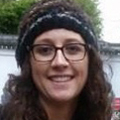Personal Mention
 Meagan Mauter, an assistant professor of civil and environmental engineering and engineering and public policy, has been awarded a Faculty Early Career Development (CAREER) Award from the National Science Foundation. The CAREER Award supports junior faculty who exemplify the role of teacher-scholars through outstanding research and education. Mauter, who holds courtesy appointments in the Chemical Engineering and Materials Science & Engineering departments, will use her five-year CAREER Award to reduce air and water pollutant emissions from power plants. Mauter's CAREER research will build upon and unify her past research topics, which include studying waste heat driven water treatment processes, investigating the limitations of these processes and looking at tradeoffs between air and water emissions at these power plants. Find out more.
Meagan Mauter, an assistant professor of civil and environmental engineering and engineering and public policy, has been awarded a Faculty Early Career Development (CAREER) Award from the National Science Foundation. The CAREER Award supports junior faculty who exemplify the role of teacher-scholars through outstanding research and education. Mauter, who holds courtesy appointments in the Chemical Engineering and Materials Science & Engineering departments, will use her five-year CAREER Award to reduce air and water pollutant emissions from power plants. Mauter's CAREER research will build upon and unify her past research topics, which include studying waste heat driven water treatment processes, investigating the limitations of these processes and looking at tradeoffs between air and water emissions at these power plants. Find out more.

 Susan Tsu (far left), the Bessie F. Anathan Professor of Costume Design, and Suttirat Larlarb, an associate professor of costume design, have have won Theatre Development Fund Irene Sharaff awards; an honor among the highest in American costume design. Tsu has been awarded the Lifetime Achievement Award, and Larlarb has been awarded the Young Master Award.
Susan Tsu (far left), the Bessie F. Anathan Professor of Costume Design, and Suttirat Larlarb, an associate professor of costume design, have have won Theatre Development Fund Irene Sharaff awards; an honor among the highest in American costume design. Tsu has been awarded the Lifetime Achievement Award, and Larlarb has been awarded the Young Master Award.
Tsu's career has spanned over 40 years and has included designs for such hits as the original production of "Godspell" and "The Joy Luck Club." Many of those years she has spent as an educator as well, teaching at Boston University and the University of Texas at Austin, before returning to her alma mater, Carnegie Mellon.
Larlarb's award-winning career includes working on the opening ceremony of the 2012 London Olympics and designing costumes for the film "Steve Jobs" and the acclaimed Broadway musical "Finding Neverland."
Tsu and Larlarb will receive their awards during a ceremony in New York City on May 20. Find out more.
 Tzahi Cohen-Karni, an assistant professor of biomedical engineering and materials science and engineering, has received an NSF CAREER Award to develop nanosensors to monitor the electrical activity of cells in three dimensions — a feat that until now has not been possible. This project has huge long-term implications. In the biological field, heart cells, or cardiomyocytes, serve as a potential therapy for heart defects and conditions. Monitoring these cells in 3-D will provide more insight into the way cells really communicate. "When it comes to the heart and the brain," Cohen-Karni said, "whatever we do is due to this intracellular communication. To some extent, we know what is happening inside. But having the tools to explore it in a quasi-controlled manner will help us to understand exactly how they talk to each other." Find out more.
Tzahi Cohen-Karni, an assistant professor of biomedical engineering and materials science and engineering, has received an NSF CAREER Award to develop nanosensors to monitor the electrical activity of cells in three dimensions — a feat that until now has not been possible. This project has huge long-term implications. In the biological field, heart cells, or cardiomyocytes, serve as a potential therapy for heart defects and conditions. Monitoring these cells in 3-D will provide more insight into the way cells really communicate. "When it comes to the heart and the brain," Cohen-Karni said, "whatever we do is due to this intracellular communication. To some extent, we know what is happening inside. But having the tools to explore it in a quasi-controlled manner will help us to understand exactly how they talk to each other." Find out more.
 Danielle Wenner, assistant professor of philosophy, was featured on the American Philosophical Association (APA) blog in an installment of its early-career research spotlight. Wenner’s work focuses on the intersection of global justice and bioethics, and argues against the exploitation of research subjects in low- and middle-income countries. According to Wenner, research in these parts of the world is not ethically justified unless the knowledge produced is meant to improve these communities. In an interview on the blog, Wenner describes this and other aspects of her work. Read the full interview on the APA blog.
Danielle Wenner, assistant professor of philosophy, was featured on the American Philosophical Association (APA) blog in an installment of its early-career research spotlight. Wenner’s work focuses on the intersection of global justice and bioethics, and argues against the exploitation of research subjects in low- and middle-income countries. According to Wenner, research in these parts of the world is not ethically justified unless the knowledge produced is meant to improve these communities. In an interview on the blog, Wenner describes this and other aspects of her work. Read the full interview on the APA blog.
 Assistant Dean for Educational Initiatives Jennifer Keating-Miller recently co-authored an op-ed that appeared in the Post-Gazette. In “The Easter Rising, 100 years later,” Keating-Miller, who also teaches in the Department of English, and Colin McCabe, distinguished professor of English and film at the University of Pittsburgh, describe the history of violence in Ireland that began 100 years ago with the Easter Rising led by Patrick Pearse. In the opinion piece, the authors state, “This was not the age of YouTube or even television. And yet, Pearse understood the poignancy and potency of performance, the ways in which public displays of violence would mobilize support for the national cause.” In light of recent terrorist attack in Brussels, Keating-Miller and McCabe note, “Pearse’s commitment to the centrality of martyrdom and the rejection of Anglo-Saxon modernity in favor of an imagined pure Gaelic past clearly prefigures the use of martyrdom videos and the appeal to an imaginary era of pure sharia law.” Read “The Easter Rising, 100 years later.”
Assistant Dean for Educational Initiatives Jennifer Keating-Miller recently co-authored an op-ed that appeared in the Post-Gazette. In “The Easter Rising, 100 years later,” Keating-Miller, who also teaches in the Department of English, and Colin McCabe, distinguished professor of English and film at the University of Pittsburgh, describe the history of violence in Ireland that began 100 years ago with the Easter Rising led by Patrick Pearse. In the opinion piece, the authors state, “This was not the age of YouTube or even television. And yet, Pearse understood the poignancy and potency of performance, the ways in which public displays of violence would mobilize support for the national cause.” In light of recent terrorist attack in Brussels, Keating-Miller and McCabe note, “Pearse’s commitment to the centrality of martyrdom and the rejection of Anglo-Saxon modernity in favor of an imagined pure Gaelic past clearly prefigures the use of martyrdom videos and the appeal to an imaginary era of pure sharia law.” Read “The Easter Rising, 100 years later.”
 After an eventful weekend of competition at CES 2016, senior mechanical engineering student Shishir Gupta walked away a winner of the Magna Student Innovation Challenge. Tasked with designing a component of what they believed cars should look like in the year 2030, Gupta and his team presented the idea of an Autonomous Intervention system that would take over control of the vehicle, but only in the case of imminent danger. For their win, Gupta and his two team members each received $6,000. Find out more.
After an eventful weekend of competition at CES 2016, senior mechanical engineering student Shishir Gupta walked away a winner of the Magna Student Innovation Challenge. Tasked with designing a component of what they believed cars should look like in the year 2030, Gupta and his team presented the idea of an Autonomous Intervention system that would take over control of the vehicle, but only in the case of imminent danger. For their win, Gupta and his two team members each received $6,000. Find out more.
